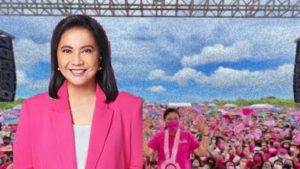I interviewed Mrs Tammy Bejar-Del Rosario May 31, 2020 and asked her questions about her lifelong learning journey in the Ateneo as an AB Political Science graduate of 1997.
I asked specifically about her Political Science training and how it has shaped her careers as part-time General Manager of a Country Club and a part-time Human Resource Consultant. She also shared with me the kind of leadership she developed as well as the essential soft skills that she cultivated having moved on from her alma mater. Tammy is now a full-time wife to Rob and “fur-mom” to their St. Bernard, Lambo. Follow her response to the interview here.
1.Do you think you were trained by Ateneo to become a leader?
My former Professor, Dr Edna Co, defined Politics as “the reflection of the balance of interests and it involves people coming together to resolve issues and conflicts”. I thought this definition made total sense given that balancing interests is not exactly a simple task to undertake. Political science instills understanding of power in local and international arenas. It means being knowledgeable about political ideas, ideologies, government, law, diplomacy, and war. More importantly it requires a deep understanding of how and why and for whom we balance interests. Indeed, it entails a critical understanding of institutions, policies, processes and behaviors, as well as groups, classes, and individuals.
Political Science gave me a realistic perspective of the world, what it means to be a citizen, how we promote our interests and hold each other accountable. This learning was complemented by our core subjects, especially our 16 units of Philosophy and 15 units of Theology, that inculcated an understanding of the Other. In my understanding, the Other pertains to everyone other than yourself (Philo majors please expound on the meaning on your own page!). Core courses ensured that Ateneans would seek to understand the Other by seeing them for who they are and not because of who we are. I recall one of my learnings: Pag labas mo sa mundo, makikita mo na hindi lahat ng tao Atenista, pero lahat ng tao ay dapat intindihin ng isang Atenista.
2. What essential skills do you think did you develop as an Atenean?
This practice of understanding the Other through a politically oriented “balance of interests” perspective of relating and collaborating with others and in resolving issues and conflicts are the foundations of being a strategic and critical thinker. These skills have helped to shape certain habits were it not for, would not have enabled me to frame situations, in which analysis of SWOT (Strengths, Weakness, Opportunities, and Threats) is centrally applicable especially in work-related situations. These include managing human resources and crisis management. When balancing interests, the challenges are to maintain or enhance strengths; take advantage of opportunities for growth; and anticipate problems and provide solutions that address weaknesses. Employing these approaches have enabled me and my co-workers to turn around the country club that I am currently managing as well as the consulting firm with which we are part owners.
3.How did your Ateneo education and Political Science training shape you as a person?
To be honest, Political Science was not my first choice when I applied to Ateneo. I had planned to take up a Management Course but all Management-related courses were full by the time I signed up so I ended up in Economics. I shifted out after my freshman year, because I realized that I did not want to “suffer” through Accounting and Calculus. I chose Political Science because it was the only Social Science course that did not require a thesis. I wanted an “easier” course so that I could focus on hanging out with friends, playing varsity basketball, and graduating in four years (yes, in that order of priority).
Given that my studies were not my priority then, I missed quite a lot but I did not fall short and failed because of these main reasons: Firstly, I had brilliant, diligent, and helpful classmates who provided me with assistance that I needed given my active extra-curricular engagements. Secondly, it was through my teachers who encouraged me to study that helped me through my appreciation of my degree program.
Professor Avelino Tendero was my teacher for 6 major subjects. I do not recall that he checked attendance until the time that he came up to me and told me “Ms Bejar, I didn’t see you in class today.” Flustered, I apologized for forgetting that I had class that day. He replied with “I know you’re very busy with your extra-curricular activities but I want you to know that I think you’re one of those students who can be whatever you want to be…as long as you apply yourself.” And he gave me a wonderful “skeletor” smile that only Political Science graduates of my generation would understand. Prof Tendero was never absent, always came to class early, and was always well prepared. The presence of only a few students in his class did not prevent him from delivering his lecture fit for a magisterial class.
Mr Dax Manacsa, gave every one of his students a letter of feedback at the end of the semester. His letter to me stated how he expected a better student and what could be done for my self-improvement. Reading his letter made me to feel ashamed but at the same time very grateful and fulfilled to have had professors who cared and who took time to give feedback. Finally I remember another story in which Mrs Lourdes Gomez, my international politics professor persisted to ask me to rewrite my paper so she could record the higher mark, an A instead of a B+. These experiences with teachers have shaped by beliefs about education, so that they have altered my behavior (for the better) and my viewpoints when I returned to school after that semester. Our teachers’ commitment to their jobs, their dedication to their students, and their kindness, taught me what it means to go the extra mile.
Having transformed from a C+ student to a B+/A student was an amazing experience of change. It felt wonderful to live up to their expectations and that’s when I realized that that was the kind of leader I would like to become—someone who sees potential in others and someone who could inspire others to be better than what they think they are.
I will always be grateful for these experiences. And to all my professors for teaching and leading by example. Salamat, Ateneo.



